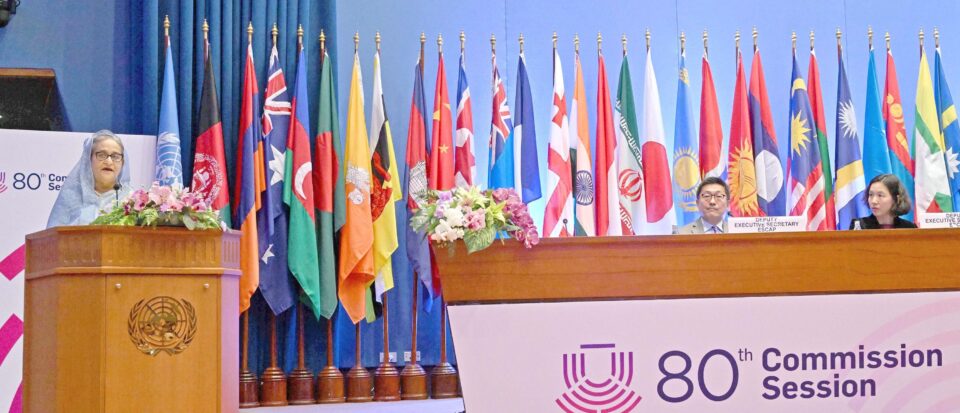Prime Minister Sheikh Hasina has urged to stand against all forms of aggression and brutality worldwide and called for a ‘no’ to war. She said that the prerequisites for sustainable development are permanent peace and security. Sheikh Hasina said, “We must speak out against all forms of aggression and brutality, and say ‘no’ to war. Bangladesh supports the United Nations Secretary-General’s ‘New Agenda for Peace’.”
Prime Minister Sheikh Hasina made these remarks while addressing the 80th session of the United Nations Economic and Social Commission for Asia and the Pacific (UNESCAP) at the United Nations Conference Center in Thailand this morning.
She urged world leaders to stop all wars, aggression, and brutality. She stated that while attacks in Gaza are causing casualties, especially among women and children, dialogue can bring peace.
Sheikh Hasina said, “War and conflict are ongoing in Palestine. It must be stopped. War cannot bring any solution.”
In this context, Sheikh Hasina mentioned the ‘Chittagong Hill Tracts Peace Accord’ initiated during her tenure in 1997, which restored peace among the people.
“We must resolve regional conflicts and tensions through dialogue and discussions,” she said. “Overall, we must show mutual respect for national sovereignty and regional non-interference.”
Prime Minister Sheikh Hasina arrived in Thailand on an invitation from Thai Prime Minister Saretha Thavip. She will be attending both bilateral and multilateral engagements during her six-day official visit to Thailand, which will conclude with her departure on April 29.
The Prime Minister urged for active roles in controlling the volatile situation in Myanmar, especially for the return of Rohingyas safely and with dignity to their homeland.
She added, “The source of their crisis lies in Myanmar, and the solution also lies in Myanmar.”
Sheikh Hasina said, “As long as the solution remains elusive, our efforts for regional connectivity, integration, and prosperity will be hindered by uncertainty. Let’s double our efforts to resolve this uncertainty.”
Sheikh Hasina referred to the ‘Mountain Peace Accord’ in Bangladesh on December 2, 1997, as an initiative to bring peace back among the people.
“We must resolve regional conflicts and tensions through dialogue and discussions,” she said. “Overall, we must show mutual respect for national sovereignty and regional non-interference.”
The Prime Minister highlighted that Bangladesh has been hosting hundreds of thousands of Rohingyas who fled Myanmar since August 2017 due to humanitarian reasons.
“The crisis is turning into the world’s largest humanitarian crisis alongside a growing population,” she said. “Rohingya women and children are bearing the brunt of various illegal activities. Drug trafficking, murder, and extortion are rampant, affecting the environment and livelihoods in Cox’s Bazar, the tourist city.”
Prime Minister Sheikh Hasina stressed the importance of taking action against climate change, biodiversity loss, and transboundary pollution in the Asia-Pacific region collectively.
She said, “We must ensure that sufficient international climate financing is available to build the capacity of vulnerable countries.”

